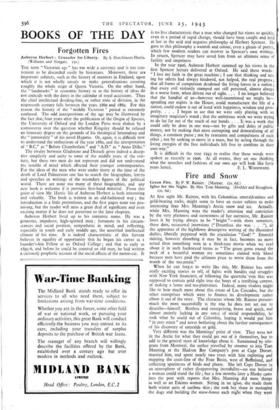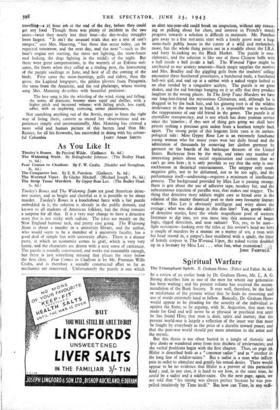Fire and Snow
Green Fire. By P. W. Rainier. (Murray. I2S. 6d.) Igloo for the Night. By Mrs. Tom Manning. (Hodder and Stoughton. 12S. 6d.)
Ar first sight Mr. Rainier, with his Colombian emerald-mines and gold-bearing rocks, might seem to have an easier subject to make interesting than Mrs. Manning's Arctic snow and ice. Actually, while Mrs. Manning wins the reader's attention and conviction by the very plainness and earnestness of her narrative, Mr. Rainier loses it by trying always to be " bright "—with short sentences, three dots, occasional inversions (" Dauntless she was . . ."), all the apparatus of the highflown descriptive writing of the illustrated dailies, liberally peppered with the ejaculation "God! " Emerald mining, however absorbing it may be in fact, becomes no more actual than something seen in a third-rate movie when we read about it in such hackneyed terms as " The green gems round the neck of a beautiful woman are sometimes stained with blood because men have paid the ultimate price to wrest them from the womb of the mountain."
When he can forget to write like this, Mr. Rainier has some really exciting stories to tell, of fights with bandits and struggles with New York financiers, of following the quartzite'vein that was supposed to contain gold right into the heart of a terrifying canyon, of making a home and tea-plantation. Indeed, many readers might like to hear much more about this estate of Las Cascadas, but the other enterprises which were to finance its development rather elbow it out of the story. The character whom Mr. Rainier presents much the most successfully is the one he does not set out to describe—himself. Restless and enterprising, brave and quick, and almost entirely lacking in any sense of social responsibility, he took what he could out of Colombia, hoping it would put him " in easy street " and never bothering about the further consequences of his discovery of emeralds or gold.
Very different was the Mannings' point of view. They were not in the Arctic for what they could get out of it themselves, but to add to the general store of knowledge about it. Summoned by tele- gram from Montreal, the author travelled by steamer to join Tom Manning at the Hudson Bay Company's post at Cape Dorset, married him, and spent nearly two years with him exploring and mapping the coast-line of the Foxe Basin, west of Baffinland, and collecting specimens of birds and plants. She left Cape Dorset in an atmosphere of rather disapproving incredulity—no one believed a woman could stand the life ; but a few months later a Husky came into the post with reports that Mrs. Manning did most things as well as an Eskimo woman. Sitting in an igloo, she made them both winter suits of caribou skin ; she took her share in managing the dogs and building the snow-house each night when they were travelling—a 2 hour job at the end of the day, before they could get any food. Though there was plenty of incident in the two years—twice they nearly lost their boat—the day-to-day struggles loom largest. "It isn't the unusual trials that are a test of one's temper," says Mrs. Manning, " but those that occur today, .:an be expected tomorrow, and the next day, and the next "—such as the boat's engine not starting, the stove not lighting, the snow-house roof leaking, the dogs fighting in the middle of the night. But there were great compensations, in the warmth of an Eskimo wel- come, the feasts when they called at a trading post, the blossoming of the purple saxifrage in June, and best of all the coming of the birds. First came the snow-buntings, gulls and eiders, then the geese, the Lapland longspurs, the golden plovers from Patagonia, the terns from the Antarctic, and the red phalarope, whose mating song Mrs. Manning describes with beautiful precision: The love song is like the whistling of the wind, rising and falling; the notes, all pizzicato, become more rapid • and shriller, with a higher pitch and increased volume; with falling pitch, less rapid, softer, with an imploring, caressing, minor plaintiveness. Not snatching anything out of the Arctic, eager to learn the right way of living there, content to record her observations and ex- periences simply and unsensationally, Mrs. Manning has created a more solid and human picture of this barren land than Mr. Rainier, for all his fireworks, has succeeded in doing with his colour-































 Previous page
Previous page